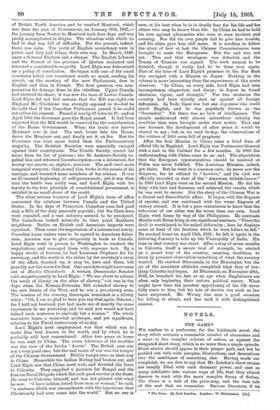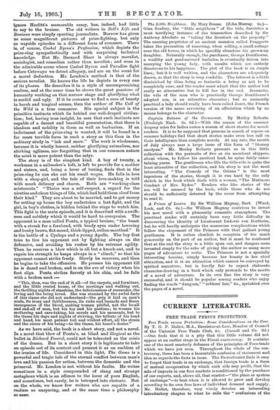THE GAME.*
WE confess to a preference for the legitimate novel, the story which contains a reasonable number of characters and a more or less complex scheme of action, as against the elongated short story, which is no more than a single episode. Short stories should appear in their proper garb, and not be padded out with wide margins, illustrations, and decorations into the semblance of something else. Having made our complaint, we are free to say that Mr. London's short stories are usually filled with such dramatic power, and cast so many sidelights into various ways of life, that they almost deserve to rank with the more complex forms of fiction. The Game is a tale of the prize-ring, and the best tale of the sort that we remember. Serious literature, if we * The Game. By Jack London. London; W. Heinemann. pea Boxiana were simply sporting journalists. Borrow has given xis some magnificent pictures of prize-fighting, but only as wayside episodes in a different form of romance. There is, of coarse, Cashel Byron's Profession, which depicts the prize-ring sympathetically and with surprising technical
knowledge. But Mr. Bernard Shaw is always moralist, sociologist, and comedian rather than novelist; and even in the admirable scene where Cashel Byron and Paradise fight before Cetewayo we detect allegory, and are on the scent for a moral deduction. Mr. London's method is that of the serious novelist. He knows the life he depicts in every one of its phases. He describes it in a style of uncompromising
realism, and at the same time he shows the great passions of humanity working on that narrow stage and glorifying what is sordid and ugly. If it be romance to find a core of beauty in harsh and tragical scenes, then the author of The Call of the Wild is a true romancer. His special subject is the primitive instincts which lie behind our well-draped civilisa-
tion; but, having true insight, he sees that such instincts are capable of a decent and beautiful presentation, that there is idealism and nobility in them as well as barbarism. If an indictment of the prize-ring is wanted, it will be found in a far more terrible form in such a story as this than in the ordinary study in "ink and snow." The work is wholesome, because it is wholly honest, neither glorifying animalism, nor shirking ugliness, nor forgetting that in our common nature the saint is more potent than the satyr.
The story is of the simplest kind. A boy of twenty, a workman in a sailmaker's loft, is left to provide for a mother and sisters, and, being a lover of boxing, finds that in the prize-ring he can eke out his small wages. He falls in love with a shop-girl, and the tale of their love-making is told with much delicacy and charm. Both are "working-class aristocrats." "Theirs was a self-respect, a regard for the niceties and clean things of life, which had held them aloof from their kind." They are about to be married, and to get money for setting up house the boy undertakes a last fight, and the girl, in boy's clothes, is hidden behind the stage to watch him.
This fight is the main episode, and it is described with a swift- ness and subtlety which it would be hard to overpraise. The opponent is a man called Ponta, a typical bruiser, "the beast with a streak for a forehead, with beady eyes under lowering and bushy brows, flat-nosed, thick-lipped, sullen-mouthed." It is the battle of a Cyclops and a young Apollo. The boy first tries to tire his opponent out by fighting always on the defensive, and avoiding his rushes by his extreme agility.
Then he receives a blow which is all but a knock-out, and to regain his strength he keeps always in a "clinch," so that his opponent cannot strike freely. Slowly he recovers, and then
he begins to take the offensive. He presses his opponent till he is dazed and broken, and is on the eve of victory when his foot slips. Ponta strikes fiercely at his chin, and he falls with a broken neck "This, then, was the end of it all—of the carpets, and furniture, and the little rented house, of the meetings and walking out, the thrilling nights of starshine, the deliciousness of surrender, the loving and the being loved. She was stunned by the awful facts of this Game she did not understand—the grip it laid on men's souls, its irony and faithlessness, its risks and hazards and fierce insurgences of the blood, making woman pitiful, not the be-all and end-all of man, but his toy and his pastime; to woman his mothering and care-taking, his moods and his moments, but to the Game his days and nights of striving, the tribute of his head and hand, his most patient toil and wildest effort, all the strain and the stress of his being—to the Game, his heart's desire."
As we have said, the book is a short story, and not a novel. In a novel that blow of Ponta's, as blind and illogical as the bullet in Richard Feverel, could not be tolerated as the crisis a the drama. But in a short story it is legitimate to take an episode out of its context and present it as an emblem of the ironies of life. Considered in this light, The Game is a
powerful and tragic tale of the eternal conflict between man's love and his passion for action, between the domestic and the primeval. Mr. London is not without his faults. He writes sometimes in a style compounded of slang and strange metaphors which is an offence to the lover of pure English, and sometimes, but rarely, he is betrayed into rhetoric. But on the whole, we know few writers who are capable of a
realism so unsparing, and at the same time a philosophy so sane. The Little Neighbour. By Mary Deane. (John Murray. Os.)— Gina Sunfrey, the "little neighbour" of the title, furnishes a most terrifying instance of the transaction described by Sir Anthony Absolute as "taking the livestock on the property." The cunning proprietor of an ancient mansion called Fmggarts takes the precaution of reserving, when selling, a small cottage near the old house, in which he speedily abandons his grown-up daughter. Naturally enough, the purchaser, George Donithorne, a wealthy and good-natured bachelor, is eventually driven into marrying the young lady, with results which are entirely disastrous to his happiness. The plot of the book is on simple linos; but it is well written, and the characters are adequately drawn, so that tho story is very readable. The interest is a little diminished by Gina being so fantastic a being as not to be completely sane, and the reader must admit that the author had really no alternative but to kill her in the end. Jeannette, the wife of the man who is practically George Donithorne's adopted son, is an attractive character ; but so eminently practical a lady should really have been called Janet, the French version of the name savouring of an affectation which by no means belongs to the character.
Captain &ileum of the Cormorant. By Morley Roberts. (Eveleigh Nash. 3s. 6d.)—With the season of the summer drapery sales for ladies comes a season of short stories for novel- readers. It is to be supposed that persons in search of repose on summer holidays find that short stories make even less call on their intelligence than complete novels. At any rate, the month of July always sees a large issue of this form of "literary anodyne." Mr. Morley Roberts presents us in this little collection with the portraits of five or six merchant skippers, about whom, to follow his nautical lead, he spins fairly enter- taining yarns. The gentleman who fills the title-role is quite the least attractive of the collection, and his story is not the most interesting. "The Comedy of the Oriana " is the most ingenious of the stories, though it is run hard by the only sketch in the book which deals with a woman, "The Mutinous Conduct of Mrs. Ryder." Readers who like stories of the sea will be amused by the book, while those who do not should be sufficiently deterred by the cover from attempting to read it.
A Prince of Lovers. By Sir William Magnay, Bart. (Ward, Lock, and Co. 6s.)—Sir William Magnay contrives to invest his new novel with a pleasantly romantic atmosphere. The practised reader will certainly have very little difficulty in discovering the identity of Lieutenant Ludovie von Bortheim, but he will hardly anticipate the numerous complications which follow the elopement of the Princess with that gallant young gentleman. It is rather churlish to complain of too much generosity on the part of an author, but it must be confessed that at the end the story is a little spun out, and dangers seem invented simply for the sake of giving the author so many more pages of adventure to write. The Princess is not a specially interesting heroine, simply because her beauty is her chief attraction, and it is an attraction which cannot be convoyed by spirited narrative; but is hardly fair to expect elaborate character-drawing in a book which only pretends to the merits of a novel of adventure. In its own line the story is very successful, and it should be popular among readers who enjoy finding the words "dungeon," "robbers' lair," he., sprinkled over the pages of a novel.







































 Previous page
Previous page